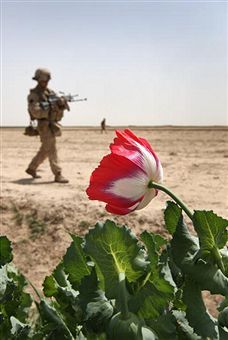 On Wednesday, Baroness Kinnock told the Lords that a number of Foreign Office departments had been hit been hit by an estimated £110 million budget shortfall, and that an anti-drug program in Kabul has been cut. Coming after British dismay at President Karzai’s desire to put Afghanistan’s former (and widely-discredited) Interior Minister, Zarar Ahmad Moqbel, in charge of the country’s anti-drug effort, the cuts are bound to cause concern. Afghanistan is the world’s leading supplier of opiates, trafficked as opium, morphine and heroin. Over 90 percent of the heroin on the UK’s streets originates from Afghanistan.
On Wednesday, Baroness Kinnock told the Lords that a number of Foreign Office departments had been hit been hit by an estimated £110 million budget shortfall, and that an anti-drug program in Kabul has been cut. Coming after British dismay at President Karzai’s desire to put Afghanistan’s former (and widely-discredited) Interior Minister, Zarar Ahmad Moqbel, in charge of the country’s anti-drug effort, the cuts are bound to cause concern. Afghanistan is the world’s leading supplier of opiates, trafficked as opium, morphine and heroin. Over 90 percent of the heroin on the UK’s streets originates from Afghanistan.
Though cuts to counterterrorism programs are probably ill-advised, there is less reason to worry about the impact on any anti-drug efforts. First, there has been no correlation between coalitional, or UK, spend on anti-drug efforts in the last few years and the cultivation of poppies. Until 2009, the US spent £550 million-a-year on anti-drug efforts only to see the rates of cultivation increase every year. Though I have not done the sums, I doubt the British record is any different.
Second, according to British officials, even the very threat of cuts has resulted in a useful prioritisation exercise – meaning that more effort is focused where it is really needed. I’m inclined to believe them, having seen the priority-free policy process up close. Senior officials privately admit that Whitehall machinery finds prioritisation difficult without budget pressure. CoffeeHousers will not find this Reaganite insight novel.
Third, and perhaps most importantly, things are actually going better than many expected. Cultivation is down for the second year, with a 30 percent cut in Helmand. What’s more, the Kabul government is getting better at investigating and prosecuting drug-smuggling criminals. Last summer, for instance, a so-called ‘High Value Target’ – a kingpin, in other words – was successfully sentenced.
Having said that, I remain sceptical that the international community can fully deal with the cultivation in the absence of peace, proper governance and some growth in non-drug sectors. But one of the Foreign Office’s rising stars, David Slinn, the former ambassador to North Korea, and British Representative in Helmand, is now in charge of the effort – which bodes well.
Cutting costs is a sensible aim in good times, a necessity in bad times, and can often have an advantageous impact on government programs or no adverse effect at all. That would seem to be the case with the Government’s anti-drug measures in Afghanistan.






Comments